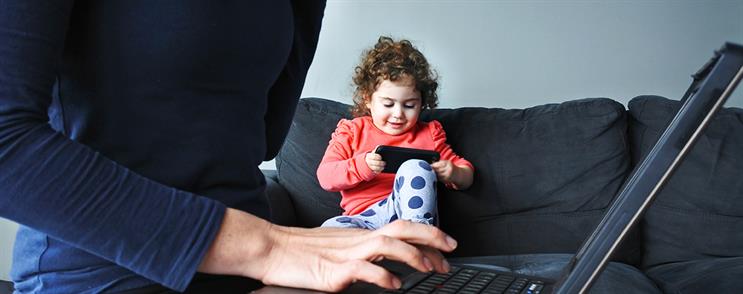
The figures were part of research released today by Digital Mums, the social enterprise specialising in training mums in digital skills for work. The report is part of the organisation’s inaugural #WorkThatWorks campaign, which has been launched to promote the benefits of flexible working.
The report calls for a sea-change in thinking among businesses and urges them to ditch the "coat on the back of the chair" culture in order to tackle the"motherhood penalty", which sees women compromise in salary and status to find a rewarding career that fits around their family life. It follows research revealing that the number of expectant and new mothers forced to leave their jobs has almost doubled in the UK to 54,000 since 2005. The gender pay gap, meanwhile, has been shown to consistently rise for 12 years after a first child is born, from 18% to 33% less hourly pay than men.
According to the #WorkThatWorks report 2.6 million mothers are currently out of the work force, classifying themselves as stay-at-home mums. While for some of these women staying at home is a choice, the research suggests that a much larger number would like to have the option to go back to work but feel like their hands are tied because of a lack of flexible working options. Almost seven in ten (68%) of stay-at-home mums living with children aged 18 and under said they would go back to work in some capacity if flexible working around childcare was an option.
And it is not just stay-at-home mums who are affected by a lack of flexibility in the workplace; the research reveals that 60% of working mums living with children aged 18 and under do not have access to flexible working. This is despite the fact the Government introduced laws in 2014 in order to allow everyone the legal right to request flexible working.
The research found 64% felt that their skills and experience had been compromised in some way in order to find a flexible job that fitted around childcare. The report also said 39% of working mums and those planning to return to work after maternity leave currently have access to flexible working. London has the lowest percentage of working mothers, with the research revealing that the capital is the least successful region in the UK when it comes to offering flexible working options.
The research suggests that a societal change needs to take place to embrace flexible working as a "normal" and accepted way of working. This will not only help mums find rewarding work that does not compromise their skills or family life; it will also help businesses tap into a wider talent pool that is being lost to an unnecessarily rigid work pattern, and will increase output for businesses and the economy as a whole.
As the report explains: "Work is a thing you do, not a place you go or a set time you do it at. Obviously, there are some roles that need to be performed during certain hours and at certain locations, but most jobs can easily be adapted to flexible working hours.
"With today’s technology making working from anywhere and at any time collaborative and seamless, there’s never been a better time to push for a societal shift in our working ways."




.jpg)
.jpeg)
